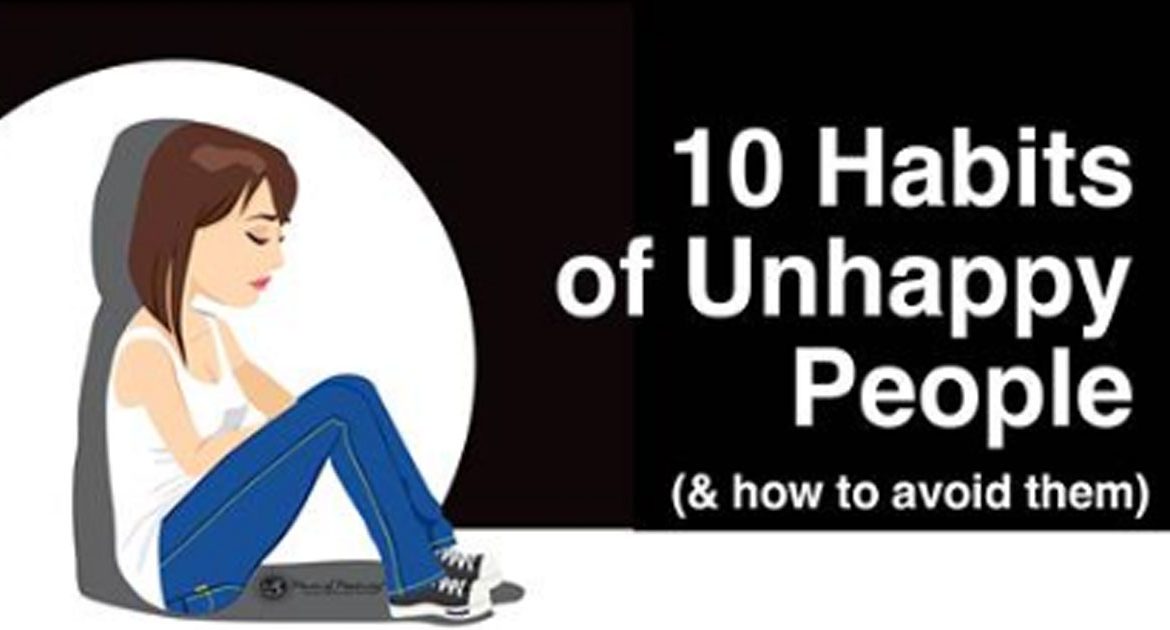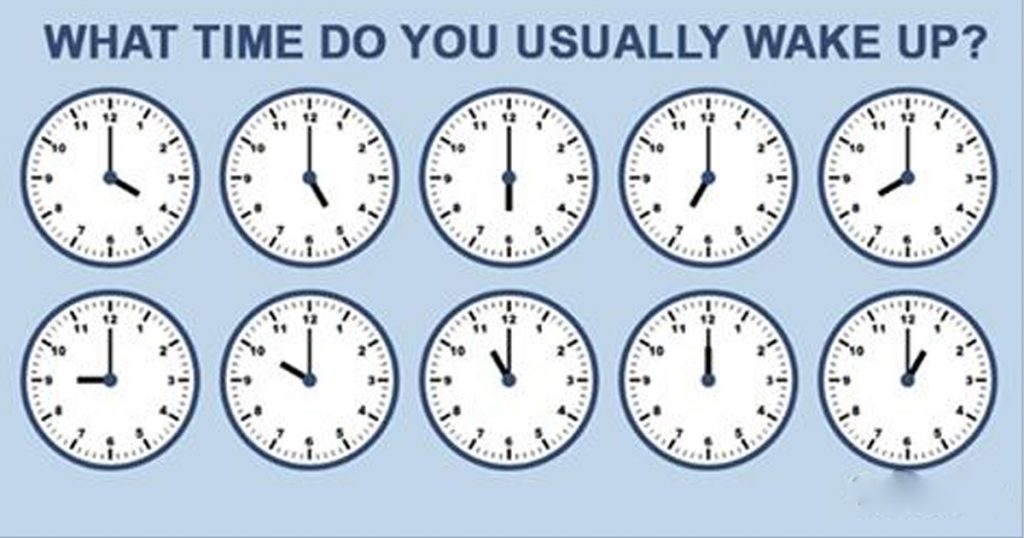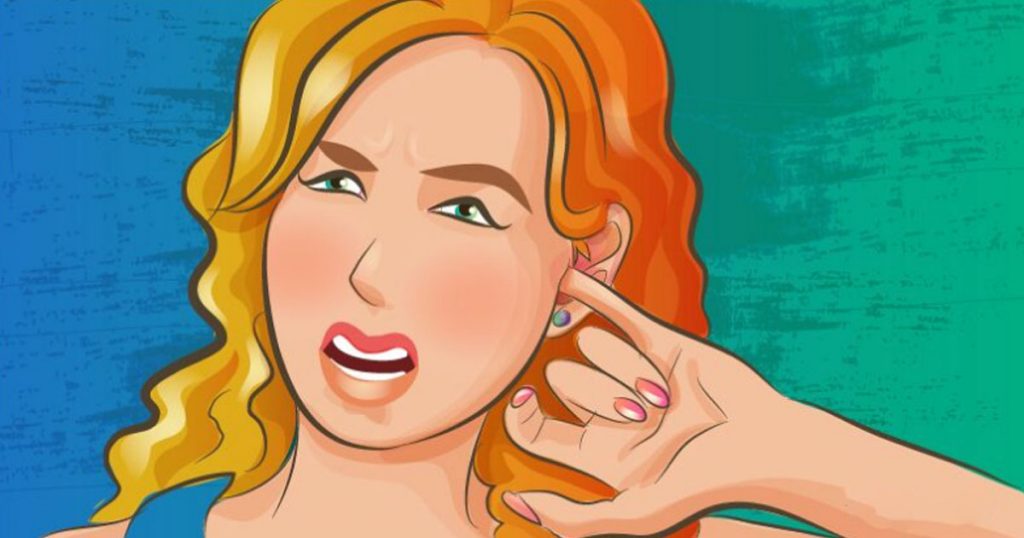“I am determined to be cheerful and happy in whatever situation I may find myself. For I have learned that the greater part of our misery or unhappiness is determined not by our circumstance but by our disposition.” – Martha Washington, wife of 1st U.S. President George Washington
Happiness is something that we all strive to attain. As human beings we can accept the fact that: (a) life is short, and (b) unhappiness makes our lives difficult. As is common knowledge, our habits have a big impact on the quality of life that we live; specifically, these habits directly impact our happiness (or lack thereof).
To make a clear distinction, there is a strong difference between clinical depression and chronic unhappiness. Depression is a chemical imbalance in the brain, while unhappiness is a disposition that is often acquired through how we choose to live our lives. Similar to depression, however, unhappiness can be diagnosed and treated.
HERE ARE 10 HABITS OF UNHAPPY PEOPLE, ALL OF WHICH CAN BE AVOIDED.
1. CHRONIC COMPLAINING
Happy and successful people do not complain much. On the other side, it seems that chronic complainers always have something negative to say… even when those around them are happy! The bottom line: we all have different circumstances that we are given in this lifetime, but in the end these circumstances are ours – fair or unfair, wanted or unwanted. Instead, seek solutions to problems instead of complaining, which leads to nowhere.
2. BEING CRITICAL – OF SELF AND OTHERS
How we talk to ourselves shapes our self-image, for better or worse. Self-worth is an essential component to our happiness, and feeling good about ourselves is a right that we all have. Realize when mistakes are made, accept them, and move on…don’t engage in negative self-talk. Further, respect the inherent differences of others and recognize their right to live happily and without undue criticism.
3. LIVING BEYOND MEANS
We live in a materialistic society, one where we are constantly bombarded with advertisements for the latest car, gadget, or credit card; all promising an easier, more fulfilling existence. Don’t believe it for a second. While purchasing a new product may provide a needed emotional boost, it doesn’t last. Ever heard the term “buyer’s remorse”? It exists for a reason. Instead, seek out something to do that doesn’t involve whipping out a piece of plastic – exercise, reading, sightseeing, etc. – anything brings satisfaction without the debt.
4. NEGATIVE ADDICTIONS
Most things are good in moderation – food, a drink or two, entertainment… it’s when these things take center stage in our lives that it becomes a problem. Unfortunately, many good people have met their end through addictive habits, especially through dependence on alcohol and drugs. A great preventative measure and remedy to these addictions? Finding and living our passions to the greatest extent possible (see #8).
5. REGRETTING THE PAST
Regret is not only useless, it can be extremely harmful. Research continues to show that repetitive, negative thoughts about decisions made in the past in often a precursor to chronic stress and depression. According to Psychology Today, there are four ways to cope with regret: (1) learn from mistakes but don’t dwell, (2) if nothing can be changed about the situation to let it go, (3) make sure too much blame is not being undertaken, and(4) reframing the situation more positively.
6. WORRYING ABOUT THE FUTURE
We only have so much say in what our future holds. This is not meant to disempower (quite the opposite); rather it is stating simple truth. What we can do is live in the present while fully exercising our God-given abilities and talents, enabling and empowering us to live a happier existence. There’s that phrase again: living in the present. Face difficulties as they arise and let them go. Enjoy the beautiful things in life and experience them fully…be present.
7. BEING DRIVEN BY FEAR
Yes, fear can be an enabler to unhappiness. To fully understand this, we have to again go back to being present. Quite simply, we can’t allow fear of the unknown (and/or the unavoidable) to cripple our quality of life. Fear is a negative thought process that is often on auto pilot. Remember: we are not our negative thoughts. We are not fear, worry, anxiety, or any other negative thought process.
8. GOSSIPING
Nothing exudes unhappiness and insecurity more than negative small talk about someone else. After all, why would a happy, confident person engage in something that is of no benefit? They wouldn’t. Gossip is something to be left to the kids at recess, not to adults attempting to make their lives (and others!) better.
9. HOLDING GRUDGES
Similar to other negative emotions, animosity is a needless weight on our backs. We are all witness to the negative behaviors of other people and can become (sometimes justifiably) angered as a result. But remember: this isn’t about their ignorant behavior; it’s about your happiness. Either forgive, forget, or ignore… and move on with your life.
10. EXPANDING OUR PROBLEMS
When we experience unhappiness and discontent, our first reaction is almost entirely emotional. In other words, we blow things completely out of proportion. After all, we still have that darned “lizard brain” (amygdala) – the epicenter of negative emotions. Instead, just take a step back, look at the problem objectively (with minimal emotion), and focus on a solution!
Once aware of these habits, you can make sure to keep them at bay by following the advice mentioned above.
Join the discussion: What negative habits do you try to avoid?






